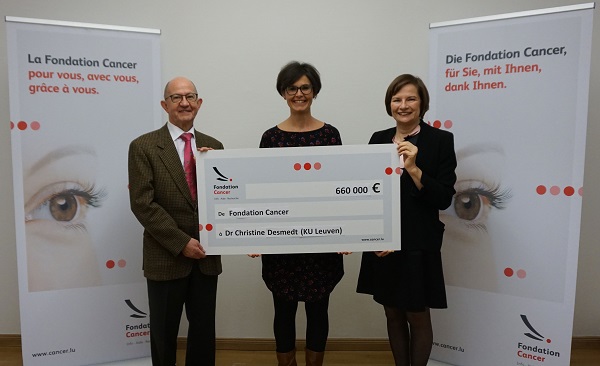 (L-R): Dr Carlo Bock, President of Fondation Cancer; Christine Desmedt; Lucienne Thommes - Director of Fondation Cancer;
(L-R): Dr Carlo Bock, President of Fondation Cancer; Christine Desmedt; Lucienne Thommes - Director of Fondation Cancer;
One of the major objectives and challenges of the biomedical sciences is the development of personalised treatments adapted to the individual characteristics of patients and their illness. In the field of cancer, these personalised treatments aim to target the biological characteristics of the tumour. Inflammation and obesity are recognised risk factors for the development and progression of several cancers, including breast cancer. Nevertheless, to date, breast cancer patients are treated independently of their BMI (Body Mass Index) for lack of further research on the subject. In this project, researchers from KU Leuven, in collaboration with the Centre Hospitalier Luxembourg (CHL), wish to better characterise the biology of these tumours according to the adiposity of the patients in order to identify mechanisms of response or resistance to current treatments as well as potential therapeutic targets in patients with high BMI.
BMI, a practical but perhaps imperfect parameter for estimating patient adiposity
Several molecular mechanisms have been proposed to explain the effect of obesity on the development and progression of the disease. The most important are related to the effects of estrogen, adipokines, insulin signalling and inflammation. In the breast, hypertrophied adipocytes and Crown-like structures (CLS), composed of dead or dying adipocytes surrounded by macrophages, have been reported to mediate pro-inflammatory markers of adiposity. Although these were initially described in patients with high BMI, they were also recently reported in a significant proportion in women with normal BMI, suggesting that their presence may reflect a state of metabolic obesity, despite a normal BMI.
The first part of the project will aim at identifying the molecular characteristics of the tumours according to the adiposity, evaluated at the level of the patient by the BMI, as well as at the level of the mammary gland by the size of the adipocytes and the presence of CLS. Dr. Desmedt and her team will evaluate e.g. at the genomic level, if increased adiposity is associated with a higher number of mutations and / or the presence of certain mutated genes. They will also assess at the transcriptomic level whether increased adiposity is associated with disruption of certain signalling pathways or pro-tumoural processes.
In this second part of the project, researchers will characterise the different cell types present in the tumour microenvironment and in normal breast tissue adjacent to the tumour, giving special attention to immune cells. These results could then generate hypotheses about potential immunotherapeutic strategies. This part of the project will be based on a prospective collection of samples of patients with breast cancer followed either at the CHL or the University Hospital of KU Leuven.
In the last part of the project, researchers will evaluate the mammary adipocytes of more than 3,000 patients treated with adjuvant hormone therapy in the context of a study to better characterise them and evaluate their prognostic value.
The researchers expect that the results of this project will have a significant impact on understanding the impact of obesity on the biology, progression and treatment of breast cancer, with potentially direct on the clinical management of overweight or obese patients.








